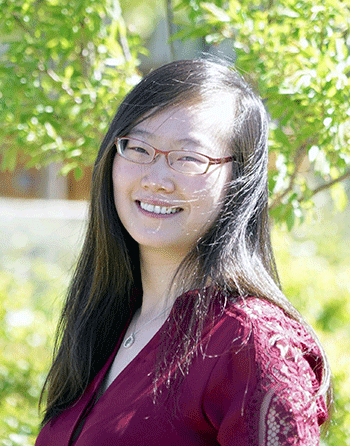
Professor Yue ‘Jessica’ Wang, with the Department of Materials Science and Engineering in the School of Engineering, has received a National Science Foundation CAREER award, the 25th recipient from UC Merced.
CAREER awards are among the NSF’s most prestigious awards. They are given through the Faculty Early Career Development Program to recognize untenured faculty members as teacher-scholars. Early-career faculty members are selected on the strength of their research proposals, but also because they demonstrate the potential to serve as academic role models in research and education and to lead advances in their field and organizations.
Wang joined the campus in 2017. Her research involves organic electronics and interfacing electronic devices with biological systems. She and her lab have been working to make organic polymers that can be turned into wearable, foldable, recyclable, biodegradable electronic devices including cell phones and medical monitors. Her work earned her a coveted spot as one of 10 finalists for the highly competitive Moore Inventor Fellowships last year.
In addition, Wang was a finalist at the Burroughs Wellcome Fund Career Awards at the Scientific Interface in 2016; won the Norma Stoddart Prize for Excellence in Graduate Research and Exemplary Citizenship in 2015; was recognized for Excellence in Graduate Polymer Research by the American Chemical Society; and won first place in a Science as Art Competition by the Materials Research Society in 2013. She was an NSF Graduate Research Fellow from 2010 through 2013.
“We knew in 2017 that we were hiring a fast-rising star. Jessica’s creativity in transformative research spans molecular fundamentals, novel materials properties and innovative devices. She has achieved the distinctive success of a CAREER award at her first attempt, and after little more than two years in her post,” said founding faculty member Professor Christopher Viney, department chair.
The CAREER award begins July 1, 2020, and provides $610,000 over five years for Wang and her research lab to investigate how to build impact-adaptive polymers that also conduct electricity.
“We are trying to create a material that becomes tougher as the degree of impact gets stronger,” Wang said. To do that, she and her students need to understand the fundamental deformation mechanisms of polymers. If they can design a material that not only has such impact-induced protective properties but can heal itself from any damage it sustains on impact, the applications are nearly limitless — from unbreakable cell phones and impact-proof car parts to football helmets that better protect players from head injuries.
The grant also provides for outreach, which her undergraduate students came up with. The students in her lab use 3D printers to print add-on components that turn their basic machines into high-end, versatile printers, and they want to share those with students in K-12 classrooms and teach them about creating polymers for uses in various disciplines. Wang and her students plan to work with the campus’s CalTeach program to reach out to classrooms around the Valley and to UC Merced students in other fields.
“This is a really exciting field of research, and I’m very thankful that the NSF is recognizing our science,” Wang said.






